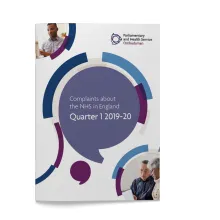Casework spotlight
Each quarter we use this report to highlight some of the emerging themes we see in our casework. Here, we look at issues experienced by patients with autism and learning disabilities in NHS services.
Ask Listen Do
In July 2018 we signed up as one of the strategic partners for NHS England’s Ask Listen Do project. Ask Listen Do aims to make it easier for people with a learning disability, autism or both (and their families and carers) to give feedback, raise a concern or make a complaint about health care, social care or education.
The Care Quality Commission’s recent ‘State of Care’ report identified that difficulties in accessing the right care can result in people with a learning disability or autism being detained in unsuitable hospitals. The case summaries below are complaints we investigated during Quarter 1 that highlight some of the issues patients with autism and learning disabilities experienced with NHS services.
Case summary 1
Ms G complained that Tameside and Glossop Integrated Care NHS Foundation Trust failed to provide her late brother, Mr G, with sufficient food or water and that he was inappropriately transferred to different wards without a suitable care package in place. Ms G also complained about poor complaint handling and communication by the Trust.
Mr G was admitted to the Emergency Department and diagnosed with pneumonia.
Our investigation found that:
- there were appropriate assessments and plans in place for Mr G
- he was adequately hydrated during his time at the Trust
- the Trust’s complaint handling was thorough and timely.
Our investigation found failings in:
- the length of time it took the Trust to implement intravenous feeding
- the level of communication with Ms G
- the continuity of care between wards.
Ms G’s brother had mild learning difficulties and was moved between wards five times in as many days during his stay at the Trust. Our investigation found that the management of Mr G’s transfers, and communication about this with him and his sister fell short of relevant standards, and was a failing.
Staff at the Trust expressed concerns to Ms G over whether they could provide the level of care needed by Mr G. Ms G also spoke to staff expressing concerns that, although her brother may have indicated that he understood, this was often not the case and he was often frightened and confused at the time of the moves.
Nutritional assessments also indicated that Mr G was malnourished due to the length of time it took the Trust to give intravenous feeding, which would have also caused him and Ms G further distress.
The Trust had already produced an action plan following the local complaints process. This addressed the issues we identified in our investigation relating to the level of communication and the level of continuity in care between wards, as well the length of time it took the Trust to implement intravenous nutrition.
Our recommendations
We recommended that the Trust:
- provide written confirmation that the plan had been implemented and monitored within three months of our final report
- update the action plan to include learning from its failures in relation to the delay in completing a capacity assessment.
Case summary 2
Ms R complained about the care and treatment her son received during an eight day stay at Lancashire Care NHS Foundation Trust. Ms R contacted the Trust’s mental health service as her son was experiencing paranoid beliefs, hallucinations and was becoming increasingly agitated.
He was subsequently admitted to the Trust’s acute psychiatric ward. Ms R complained that this was not a suitable environment for her son due to his autism, and that mixing with patients with substance and alcohol abuse issues was frightening and had a detrimental impact on him.
We also investigated several events that occurred on the ward which were extremely distressing to Ms R and her son. Ms R complained that her son was allowed to walk around the ward with a holdall of wet clothing, and to cover himself and his bedding with his own faeces on more than one occasion. Ms R also complained that her son suffered physical attacks and poor care, and that an inpatient stole his phone and falsely informed Ms R that her son had attempted suicide.
The Trust carried out an initial assessment in line with Department of Health guidance. Our investigation identified failings in documenting risks to Ms R’s son while he was on the ward, and the lack of a structured care plan.
While the Trust recognised that the events Ms R complained about had occurred, they could not say how they happened as there was no record in the medical notes. This was also a failing, particularly as Ms R raised concerns with the Trust at the time.
The Trust had already carried out a full investigation and acknowledged the failings we identified during our investigation. They apologised to Ms R and invited her to take part in planned improvements to the service at the Trust. However, the Trust had not recognised some specific failings identified in our report relating to care planning, risk assessments and record keeping.
The Trust’s response letters did not address the impact these failings had on Ms R and her son, or set out how they would improve services to ensure the same failings did not happen again.
Our recommendations
We recommended that the Trust:
- apologise to Ms R and her son for the failings we identified
- share an action plan with Ms R and the Care Quality Commission setting out how it will address the problems identified, including how it will improve its complaint handling process
- pay £750 to Ms R and her son to compensate them for the injustice they experienced.
Download our report on Complaints about the NHS in England: Quarter 1 2019-20 [PDF 2.22 MB]

